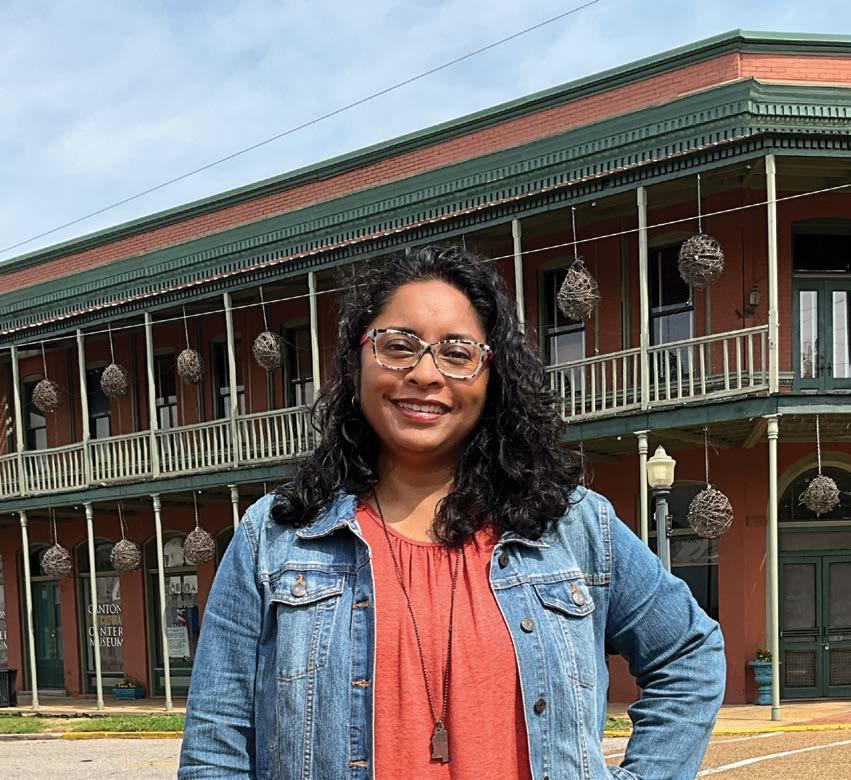






























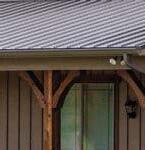
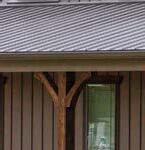
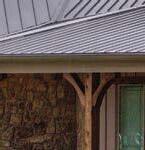























































On June 13, 2022, just six days before Father’s Day, my dad, Manuel L. Callahan, suddenly passed away. He was 77 years old. I have read that the manifestation of a father’s love is the desire for his son to become a better man than his father. If that is so, how does one measure a man? Is it by the possessions he acquires? Perhaps is it the position he attains in business? Do we judge a man by the company he keeps, or his stature in the community? Does holding advance educational degrees make one man better than another?
My dad was born in Tarrant City, Alabama, just north of Birmingham. He had a G.E.D. and worked most of his life in the steel industry, until his company went bankrupt while he was in his 50s. My dad never failed to provide for my mom and myself. We always had a roof over our head, clothes on our bodies, and food to eat. I know there were times when money was tight, but he always found a way to make ends meet.


While providing for his family, my dad taught his son some valuable life lessons. My dad taught me to be thankful for what I had, because there were always others with less. One night, as our neighbor’s trailer went up in flames, I watched him open his wallet and give every dime he had to help that family.

Like most Southern men, my dad was a hunter, but his true love was bass fishing. I tagged along and it wasn’t long before every hunting or fishing trip became a competition. But what I didn’t realize until later was that my dad used these trips to talk about issues and things that I needed to know and understand to be a man. I learned many valuable life lessons sitting in the back of that bass boat. Dad always spoke to me about God, or as he would say, “the man upstairs.” We would sit outside in the swing beside the house for
hours where he talked about honoring the Lord, loving Jesus, and giving God’s share back to him and other life’s lessons. Dad told me to love and respect my mom because, “only your mama and Jesus will love you unconditionally.” Dad told me he would bail me out of jail, “just one time.” I never needed it.
When my son was born, my dad pulled me aside and told me not to raise my son the way he had raised me. “I had to be tough on you,” he said. “There was too much temptation where we lived, and I knew it wouldn’t take much for you to go down the wrong path. I had to be hard on you. I’m sorry.”
No apology was necessary.
I know my dad was proud of the things I accomplished and the man I am. If I didn’t know it before the funeral, I knew it afterward. Everyone came up and told me, “Michael, your daddy was so proud of you.” In my dad’s eyes, his son had become a better man than himself, and that was all he ever wanted.
So how does one measure a man? Perhaps the true measure of a man lies not in what he acquires, or accomplishes in life, but in how he raises and provides for his children, the impact those children have on the world, and how those children remember him after he is gone. By that measure, it’s hard to be a better man than Manuel Callahan.
For the last time…I love you dad. Happy Father’s Day.
by Michael Callahan Executive Vice President/CEO Electric Cooperatives of Mississippi





When the sun sets, and when it rises birds fly with freedom all through the blue skies
From fields to town, lakes to river Hometown shops filled with love and joy in all its little spots
After a busy day I confide in evening walks by the lake, one mistake in just a take and it all fades away Calming books stores, smell of rustic pages, feeling of the vinyl records from that store down there

What’s that in the sky, it’s the eagle flying high, With the mighty BLAZERS along their side
The famous taste of “Umi,” To the small yet powerful aroma of the “Up & Down Eatery”
What people call base, I call home All over the states and this is the most calm
Eye opening opportunities, From president of CAFB Torch Club, and a Level Elite volleyball champ
Down here you can’t miss a day without a compliment, from strangers to loved ones in our community
I am forever thankful
To my dear state, Mississippi
by Laila C. Stewart,a member of the U.S. Air Force, and a resident of Columbus, and a member of 4-County Electric
Colors from the hanging baskets

It’s a canoe and kayak summer

A look at special people and places in Mississippi
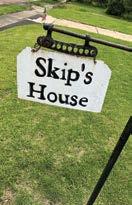
The Mississippi Film O ce is celebrating 50 years of Hollywood down south
Perfect time for seafood grilling
Walt and his plants
The Official Publication of the Electric Cooperatives of Mississippi
OFFICERS
Randy Carroll - President
Ron Barnes - First Vice President
Tim Perkins - Second Vice President
Brian Hughey - Secretary/Treasurer
Michael Callahan - Executive Vice President/CEO
EDITORIAL STAFF
Lydia Walters - VP, Communications
Steven Ward - Editor
Chad Calcote - Creative Director
Kevin Wood - Graphic Designer
Alan Burnitt - Graphic Designer
Courtney Warren - Graphic Designer
Chris Alexander - Member Services Coordinator
Steve Temple - Social Media Director
Mickey Jones - Administrative Assistant
EDITORIAL OFFICE & ADVERTISING
601-605-8600
Acceptance of advertising by Today in Mississippi does not imply endorsement of the advertised product or services by the publisher or Mississippi’s electric power associations. Product satisfaction and delivery responsibility lie solely with the advertiser.
• National advertising representative:
American MainStreet Publications, 800-626-1181
Circulation of this issue: 470,450
Non-member subscription price: $9.50 per year.
Today in Mississippi (ISSN 1052-2433) is published 12 times a year by Electric Cooperatives of Mississippi Inc., P.O. Box 3300, Ridgeland, MS 39158-3300, or 665 Highland Colony Parkway, Ridgeland, MS 39157. Phone 601-605-8600. Periodical postage paid at Ridgeland, MS, and additional o ce. The publisher (and/or its agent) reserves the right to refuse or edit all advertising. The magazine is published for members of subscribing co-ops. The magazine is a bene t of membership.
POSTMASTER: Send all UAA to CFS. (See DMM 507.1.5.2) NON-POSTAL AND MILITARY FACILITIES: send address corrections to: Today in Mississippi, P.O. Box 3300, Ridgeland, MS 39158-3300
www.facebook.com/TodayinMississippi
www.todayinmississippi.com
Mississippi Film O ce Director Nina Parikh stands in Canton’s downtown square. The building behind her was used extensively in the lming of the 1996 Matthew McConaughey lm, “A Time to Kill.” Photo by Chad Calcote.
Central Electric Power Association, Coahoma Electric Power Association, Coast Electric Power Association, Delta Electric Power Association, Dixie Electric Power Association, East Mississippi Electric Power Association, 4-County Electric Power Association, Magnolia Electric Power, Monroe County Electric Power Association, Natchez Trace Electric Power Association, North East Mississippi Electric Power Association, Northcentral Electric Cooperative, Pearl River Valley Electric Power Association, Pontotoc Electric Power Association, Singing River Electric, Southern Pine Electric, Southwest Electric, Tippah Electric Power Association, Twin County Electric Power Association, and Yazoo Valley Electric Power Association.
The U.S. Department of Agriculture’s (USDA) workable guidance for electric co-ops seeking to access $9.7 billion in energy innovation funding was released in mid May.

“This is an exciting and transformative opportunity for co-ops and their local communities, particularly as we look toward a future that depends on electricity to power more of the economy,” National Rural Electric Cooperative Association (NRECA) CEO Jim Matheson said. “USDA has smartly structured this program in a way that will help electric co-ops leverage new tools to reduce costs and keep energy a ordable while meeting the future energy needs of their rural communities. I’m grateful to USDA for listening to us throughout this process and for settling on rules that ensure the program is flexible and accessible to all electric cooperatives.”
NRECA worked to help shape the program, which was passed by Congress through the Inflation Reduction Act (IRA). It is designed specifically for electric cooperatives interested in purchasing or building new clean energy systems and will be administered by USDA’s Rural Utilities Service.
A wide range of eligible projects — including renewable energy, storage, nuclear, and generation and transmission e ciency improvements — allows each cooperative to determine its path based on its unique circumstances. Co-ops will be eligible to receive a grant for as much as 25% of their project cost, with a maximum amount of loans and grants limited to $970 million for any one entity.
NRECA

The Mississippi Development Authority is accepting grant applications for the 2023 Mississippi Industrial Energy E ciency Program, which is made possible through approximately $500,000 in State Energy Program funds from the U.S. Department of Energy.
MIEEP assists industrial manufacturers with making energy-eciency upgrades to their facilities, which reduces energy consumption and operating costs. Eligible energy retrofits include lighting, water heating and energy systems control, as well as heating, ventilation, and air conditioning projects, among others. Grant awards are o ered up to 50 percent of total project costs, with the award not to exceed $50,000. The minimum grant award is $15,000.
“Supporting energy-savings systems helps Mississippi companies and communities unlock the potential for tremendous cost savings. MIEEP is a prime opportunity for companies to reduce energy usage and spur a more prosperous Mississippi,” said MDA Deputy Executive Director Laura Hipp.
To date, projects implemented through MIEEP have resulted in improved working conditions for approximately 3,000 employees across a wide variety of manufacturers in Mississippi, ranging from catfish processing to HVAC component production. Those projects include lighting upgrades, compressed air system replacements and building envelope improvements that cover over 2.95 million square feet of manufacturing space.
The deadline to apply for MIEEP funding is July 14 at 5 p.m.
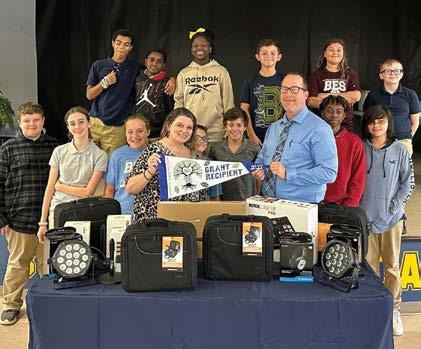
Students at Benndale Elementary in Lucedale have a new and exciting way to learn — podcasts.
Thanks to a $1,000 Neighbors Helping Neighbors Community Grant from Singing River Electric, 5th and 6th grade students can create podcasts while strengthening their research, writing, speaking, and collaboration skills.
“Many of our students are not exposed to much outside of the community in which they live, so it’s important that I, as their teacher, expose them to as much as I can while they are with me,” explains Jennifer Finley, Benndale Elementary ELA teacher.
Finley is putting the laptop, microphones, headphones, recording equipment, and editing software purchased with the grant funds to good use. The equipment will be used for a weekly classroom news broadcast, book reviews, and interviews. Listening is a key part of language comprehension, and podcasts will enhance the ELA (English, Language, and Arts) class experience.
“Podcasts will also allow students to learn new skills like producing, recording, and publishing,” adds Finley.
For more information on Singing River Electric’s Neighbors Helping Neighbors Community Grant program, visit www.singingriver.com/my-community.
One of my favorite hanging basket combinations is Supertunia petunias and Superbells.
Supertunia petunias are great for hanging baskets because they have mounding, trailing growth habits and function as both fillers and spillers in containers. They are also excellent landscape plants, best suited to be placed near the front of beds.


Superbells are also called million bells or trailing petunias because of their prolific, bell-shaped flowers and their resemblance to petunias. Like Supertunias, Superbells have mounding, trailing growth habits.
I believe Superbells Grape Punch and Superbells Yellow planted with Supertunia Persimmon make an outstanding hanging basket combo. The color contrast of purple with warm sunset colors of orange and yellow is mesmerizing.
I believe Superbells Grape Punch and Superbells Yellow planted with Supertunia Persimmon make an outstanding hanging basket combo. The color contrast of purple with warm sunset colors of orange and yellow is mesmerizing.
These plants are native to South America and typically grow 6 to 12 inches tall and 12 to 24 inches wide. They are both best grown in containers where soil moisture can be easily controlled since they don’t tolerate constantly wet soils.
Superbells are low-maintenance plants that require no deadheading. They do best when located in a full-sun location.
Another great hanging basket combination is Supertunia Vista Fuchsia, Snow Princess, and Laguna Compact Blue with Eye. The pink of Supertunia Vista Fuchsia pops with the beautiful blue flowers with white eyes of the Laguna Compact Blue with Eye and the cascading white flowers of Snow Princess. If my plants begin to look open or a bit tired, I give them an allover trim. I use a sharp pair of scissors or pruning shears to trim back up to a third of the volume of the plants. After any trim, I use a water-soluble fertilizer to provide instant energy to help kickstart new growth, branching, and flowering.

Every year, I look for ways to add interest to my front porch with colorful hanging baskets, and there are many di erent plant choices and combinations that make this possible.Growing plants in containers is a great way to control soil moisture. These Superbells Grape Punch, Superbells Yellow, and Supertunia Persimmon do not tolerate constantly moist soil.
The plants take a week to recover from the trim, but the end result is fuller plants with more blooms going forward. I repeat the trim as needed throughout the growing season.
If you are looking for a hanging basket that is di erent and unique, try a Goldfish plant.

The dark-green leaves provide a backdrop for orange flowers that resemble tiny goldfish. The flowers on a Goldfish plant may be red or yellow. Native to southern Mexico, Brazil, and Costa Rica, this plant comes in more than 25 di erent varieties.

Consistently water and fertilize these baskets to keep them popping with color all summer long on your front porch.
by Dr. Eddie SmithSouthern Gardening columnist Dr. Eddie Smith, a gardening specialist and Pearl River County coordinator with the Mississippi State University Extension Service, is an internationally certified arborist, Produce Safety Alliance certified trainer, and one of the developers of the Mississippi Smart Landscapes program that encourages the use of native plants in the landscape.

As fuel prices soar, kayaking and canoeing become more popular. After the initial purchase of a boat and required equipment, a person can enjoy a day on the water for very little cost.

“People can buy all kinds of di erent varieties of canoes and kayaks for many di erent purposes and spend as much or as little as they want,” Layne Logue of Quapaw Canoe Vicksburg said. “People can buy a used kayak for $100 to $300. A new canoe or kayak with paddles and other necessary equipment would probably cost $800 to $1,500 depending upon what someone wants.”


Besides the boat, paddles and floatation devices, paddlers should also buy a floating dry box or bag where they can keep wallets, cameras, cell phones, car keys, and other valuables they want to stay dry. People might also buy a small first aid or emergency kit.
“A kayak is low and fast, but it doesn’t hold much gear,” Logue explained. “A canoe can hold a lot of stu , but it sits higher in the water, making it more a ected by wind. A lighter boat is faster and takes less energy to paddle. After people get more experienced,
they might want to upgrade to a Kevlar or carbon fiber boat.”


Before buying any canoe or kayak, prospective paddlers should rent di erent types to see what best fits their needs and bank account. Some outfitters o er “drift trips.” They drop paddlers o upriver on a stream. The paddlers float down the river to a designated takeout spot.

“With a canoe or kayak, paddlers can get into many di erent places for very little cost,” said Chris Alexander with South Mississippi Kayak Rentals in D’Iberville. “The Tchoutacabou a Paddling Trail on the Tchoutacabou a River is a great place to paddle. Anybody can paddle it and stop at numerous sandbars to eat lunch, swim, fish, or just relax.”
Not confined to boat ramps, paddlers can launch small craft practically anywhere. Paddlers can explore tiny places where large boats cannot go. Kayak anglers often find hidden backwaters that few people ever fish. Many nature preserves, national forests, wildlife management areas, and national wildlife refuges o er excellent paddling opportunities.

“Around Jackson, many people paddle along the shorelines of Ross Barnett Reservoir,” Logue said. “Pelahatchie Creek is another good place. Many people paddle the Bogue Chitto River or Okatoma Creek in Seminary. The Strong River is another good paddling stream as is the Chickasawhay River in southeastern Mississippi. In my opinion, the top paddling stream in Mississippi is Black Creek.”
A kayak is low and fast, but it doesn’t hold much gear. A canoe can hold a lot of stu , but it sits higher in the water, making it more a ected by wind. A lighter boat is faster and less energy to paddle.






The only designated National Wild and Scenic River in Mississippi, Black Creek, runs through the 5,052-acre Black Creek Wilderness in the 518,587-acre De Soto National Forest near Hattiesburg. The nearby Leaf River, another good paddling stream, runs through the 994-acre Leaf River Wilderness.


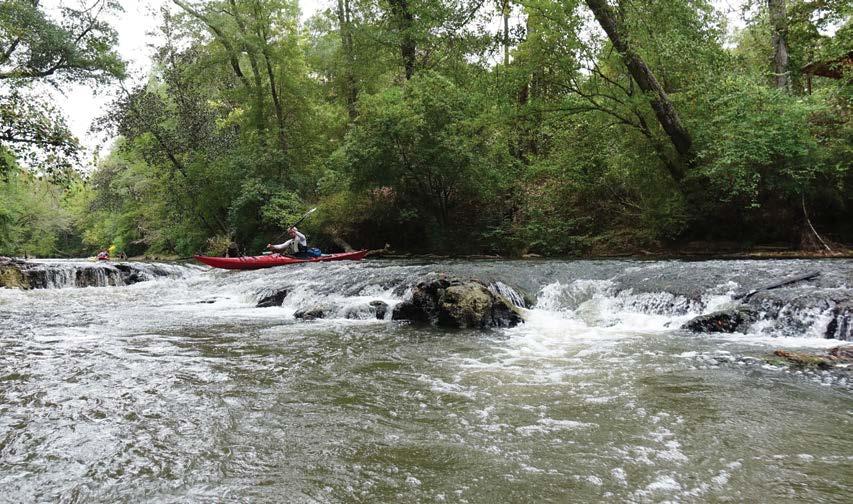
Inexperienced paddlers might consider joining a local kayaking club in which members periodically take group excursions. Logue suggests looking up The Mississippi Paddling Mafia on Facebook. Paddlers might also read “Canoeing Mississippi,” a book by Ernest Herndon.

 John N. Felsher
John N. Felsher






There’s a reason why the blueberry is Mississippi’s o cial state fruit. The state’s largest commercial fruit crop, blueberries are plentiful and have a significant economic impact.






“The acreage for blueberries in Mississippi is estimated to be between 1,000 and 1,500 acres. The production results in 1.5 to 3 million pounds of fruit,” said Eric Stafne, fruit and nut specialist with the Mississippi State University Extension Service.


Most of Mississippi’s blueberries remain in the state and are sold at local grocery stores, roadside stands, and at “U-Pick” farms. Other blueberries go to other states, such as Texas, and some have been sold overseas in the past, Stafne said.

The abundance of blueberries in Mississippi is down to soil conditions.
“The Pine Belt region of Mississippi has the proper soil pH for abundant blueberry plant growth. There are several blueberry species native to Mississippi. The most popular type is rabbiteye blueberry (Vaccinium virgatum).

Poplarville is blueberry central in Mississippi and home to the annual Blueberry Jubilee.



In 1983, the first Blueberry Council met to begin planning the first Blueberry Jubilee. The brainchild of Mimi Montieth and Mary Hough, their goal was to create a festival showcasing Pearl River County and the small jewel of the south, the blueberry, according to festival organizers.

The first Blueberry Jubilee in 1984 had a humble beginning with only a handful of craft vendors situated on the Pearl River County Courthouse lawn. Since that time, the Blueberry Jubilee has grown and flourished and now hosts about 200 arts and crafts booths annually.
CoastConnect, the broadband internet subsidiary of Coast Electric, is one of the sponsors of the jubilee.


This year’s Blueberry Jubilee will be held June 10 in downtown Poplarville from 8 a.m. to 4 p.m.


For more information about the festival, visit www.blueberryjubilee.net


Always check the farm by phone or social media to check on picking hours and availability of fruit, and prices.
AMBER’S BLUEBERRY FARM
515 Chicord River Road, Waynesboro 601-735-4840
BLUEBERRY BLUEPHORIA AT TOFT FARMS
12147 Road 247, Carriere 601-749-0136 • www.toftfarms.com
BLUE HILLS FARM
259 Joe Smith Road, Carriere 601-549-2346 or 985 607-5544. bluehillsfarm@gmail.com • Payment: Cash only
BLUE TARA ORGANIC PYO BLUEBERRY FARM
257 Langnecker Road, Poplarville 601-795-0034 or 601-403-TARA • info@pickaberry.com
BLUEBERRY ACRES FARM
5307 Hwy. 43N, Carriere 601-798-1719
BLUEBERRY HEAVEN
16705 Old Kelly Road, Vancleave 228-826-5321 • info@blueberryheaven.net
BLUEBERRY RIDGE

20 Marcus Mitchell Road, Picayune 601-798-0447 or 228-365-9163
CHARLIE’S U-PIK
257 Charlie’s Lane, Lucedale 601-530-0548 • info@charliesupik.com
DABBS WOODLAND FARM
12143 School Road, Saucier 228-669-0029 • www.dabbsfarm.com
DOUBLE S FARMS
20295 Highway 53, Gulfport 228-234-9845 • mrystok1@att.net
6 slices day-old bread, cut into 1-inch cubes, separated
1 cup fresh blueberries





1 (8-ounce) package cream cheese cut into 1-inch cubes
6 eggs, beaten

1 cup milk
¼ cup maple syrup
1 tablespoon cornstarch
1 teaspoon vanilla extract
½ cup white sugar
½ cup water
Lightly grease a 9 by 13-inch baking dish.
Arrange half the bread cubes in the dish and top with cream cheese cubes. Sprinkle 1 cup blueberries over the cheese.

In a large bowl, mix the eggs, milk, maple syrup, cornstarch, vanilla extract, sugar, and water. Pour the mixture over the bread cubes. Place the remaining half of the bread cubes on top. Cover and refrigerate overnight.
Remove the bread cube mixture from the refrigerator about 30 minutes before baking.
Preheat the oven to 350 degrees.
Cover and bake 30 minutes. Uncover and continue baking 25 to 30 minutes or until center is firm and surface is lightly browned.
SUBMISSION DEADLINE: Aug. 31. Select photos will appear in the Oct. 2023 issue.











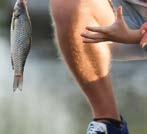














Make any statement you choose with one of our custom-crafted men’s hoodies. All are crafted in an easy-care cotton blend knit, with brushed fleece on the inside, a knit lined hood, and each showcases graphic custom art. The hoodies also feature kangaroo pockets, rib knit cuffs and hems, and a full zipper closure. Most hoodies are available in 5 sizes: Men’s M-XXXL, unless otherwise noted. Imported.


An Outstanding Value … And Your Satisfaction Guaranteed
This is a limited-time offer, so don’t miss out—order the hoodie(s) of your choice as soon as possible! Each is a remarkable value at $99.95*, payable in 3 convenient installments of $33.32. (For sizes XXL and XXXL, add $10). To order yours, backed by our 30-day guarantee, send no money now; just fill out and send in your Priority Reservation today!
Order Today at bradfordexchange.com/MensHoodies Connect with us!
YES. Please reserve the Hoodie(s) for me as described in this announcement, in the style(s) and size(s) indicated below.
M (38-40) L (42-44) XL (46-48) XXL (50-52) XXXL (54-56)

 BRIAN HUGHEY General Manager & CEO
BRIAN HUGHEY General Manager & CEO

 AMANDA PARKER PR and Marketing Specialist
AMANDA PARKER PR and Marketing Specialist



As we enter the month of June, we begin yet another hurricane season, with 2023 storm names ranging from Arlene to Whitney. While many are eager for the warmer summer months, we know all about the weather threats that occur living along the Gulf Coast this time of year. I will leave explanations of climate phenomenons such as La Niña or El Niño to the weather experts, who recently predicted a near average number of storms in the Atlantic this hurricane season.
In the coming weeks, you will hear messages encouraging you to prepare for hurricane season by storing non-perishable food, water, fuel, and batteries, and have storm evacuation routes picked out ahead of time. While this is not a topic any of us enjoy discussing, taking storm preparations seriously is of utmost importance.
Singing River Electric recently concluded the annual review of our Emergency Preparedness Plan. Should a hurricane or tropical storm approach our area, our plan contains detailed steps for employees to take once the storm enters the Gulf
of Mexico. Employees are pre-assigned specific tasks, such as securing supplies, food, fuel, and housing, while line crews, service personnel and their supervisors are assigned areas of our system to report to once the storm has passed. This everevolving plan has been activated and successfully implemented countless times.
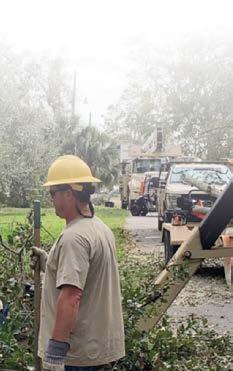

Being part of the national electric cooperative network provides Singing River Electric access to cooperative line personnel who will assist us with restoring your electric service following a disaster. Through the years, cooperative linemen from across the country have provided restoration assistance, and we have no doubt fellow cooperatives will again respond when needed. This is an immeasurable asset allowing us to speed restoration and help our communities.
I encourage you to be proactive by making your preparations for this hurricane season – it’s not too early. Be assured, in the event of a disaster, your electric cooperative is prepared to restore electric service to our members as quickly and safely as possible.
by Brian Hughey General Manager and CEOTemperatures are heating up in south Mississippi, and extreme heat causes air conditioners to work overtime to maintain your desired thermostat setting. Since cooling is one of the largest contributors to your electric bill, keep these things in mind.
• If your unit has not been serviced in the last few years, it’s time. Cleaning the coils and checking freon levels will keep your unit operating e ciently. If freon levels are a ½ pound low, your unit could operate 30% longer to do the same job, causing your electric bill to increase.

• Your outside unit needs proper ventilation to work at maximum e ciency. While in the field, I’ve seen tin and wood awning-type structures built over the outside unit – this is not a good idea as the awning can obstruct air flow.

• Changing the air filter each month will cut down on costs. A dirty filter will cause your unit to work harder to push air through to cool your home. If a dirty filter collapses, unfiltered air can clog evaporator coils and damage the unit.
• Ceiling fans should only be used when a room is occupied because they do not cool the air – they circulate air across your skin to create a cooling sensation. While feeling cooler, you can move your thermostat a degree or two higher, which saves energy and money. The recommended thermostat setting in summer is 78 degrees; each degree higher you adjust your thermostat can save 5% on energy costs. During summer, make sure the ceiling fan is moving air in a downward direction.
Visit singingriver.com/ways-to-save for more energy-saving tips.


Keep cooling costs in check this summer
Learn more about how your cooperative works and participate by voting in person in SRE’s board of directors election. Our 85th Annual Membership Meeting will be held at SRE’s Lucedale o ce located at 11187 Old 63 South. The doors open for registration at 5 p.m. and the meeting begins at 6 p.m.
The meeting will include an annual update on business of the cooperative, a report outlining 2022 financials, the board election, and more. All three districts will have an election for a Post 2 seat. Any Singing River Electric member may vote in person at the June 29th meeting. According to by-laws, SRE members should vote for one candidate in each of the three districts. Members can also vote online or return their proxy by mail.


Each member is entitled to one vote regardless of the number of accounts in the person’s name. A proxy may be assigned to the board as a whole, or a member can vote up to 200 assigned proxies at the membership meeting. The presence of a member at the meeting or an online vote, or in the case of joint membership, the presence of a spouse, shall revoke the proxy. All proxies must be received by SRE’s Lucedale o ce by close of business on June 20.
Members returning their proxy or voting online will qualify for a drawing of $500 cash. Those attending the annual meeting will be eligible for attendance prizes.
Candidates for one 3-year term by district:
James (Robert) Steele, Representing Greene, Perry and Wayne counties in Miss., and Washington County, Ala.





Roy C. Grafe, Representing George and Stone counties in Miss., and Mobile County, Ala.
Kristal K. Sisson, Representing Jackson and Harrison counties in Miss.
Deadline for nominations to be placed on the ballot was Feb. 28, 2023. This deadline and a notice for nominations was included in the Jan. and Feb. 2023 Today in Mississippi magazine issues.
You can win up to $500 by early, online voting or returning your completed proxy by mail.
1. Vote early and online by simply opening the SmartHub app or visiting www.singingriver.com and clicking on the “Vote Here” icon. By entering your membership ID and zip code, you can view candidate biographies and cast your vote by the Tuesday, June 20, deadline.
2. Vote by mailed proxy by simply completing the mailed proxy and returning using the enclosed self-addressed envelope by the Tuesday, June 20, deadline. You may still attend the meeting; your presence will rescind the proxy allowing you to vote in person.
3. Vote in person at the Annual Membership Meeting on Thursday, June 29, at the SRE Lucedale o ce located at 11187 Old 63 South.
*Deadline to vote by SmartHub app/online or return your proxy is June 20.
Represents SRE members in Greene, Perry and Wayne counties in Mississippi, and Washington County in Alabama.

Represents SRE members in George and Stone counties in Mississippi, and Mobile County in Alabama.
Represents SRE members in Jackson and Harrison counties in Mississippi.

Our core job is keeping the lights on, but our passion is serving our members. Because we’re a cooperative, our purpose is to enrich the lives of our members and serve the long-term interests of our community. This service focus is at the heart of who we are.
We were built and are led by the members we serve. Whether tested by severe weather events or a pandemic, our co-op puts people first – not just during tough times, but all the time. Over the years, our charitable e orts, sta volunteer service hours, and other locally-focused projects have served civic organizations, supported area schools and young people, planted trees, cleaned local parks, assisted families in need to keep the lights on, and much more.
Here are a few reasons why our 10-member board of directors is honored to serve you, the members of Singing River Electric Cooperative.
Kristal Sisson President, SRE Board of Directors
1
Members of our
serve on the board of directors.
I’m privileged to work with a well-informed, dedicated 10-member board of directors who provide guidance for setting co-op priorities and helping make big decisions. Because our board members live in SRE’s service area, they’re able to serve as the pulse of the larger community and identify immediate and long-term needs. The broader co-op membership provides helpful input through their vote on director elections and by weighing in on co-op and community issues.
Community Grant Program for local nonprofits, and our Energy Assistance program which helps local families pay their electricity bill when times are tough.
3 We enjoy serving our members because without you, the co-op wouldn’t exist.
Our employees live and work here too and care about our community the same way you do. We’re invested and work to help it prosper.
That’s why SRE participates in community celebrations, supports local schools and provides NHN Community Grants. It’s also why we invest in economic development, and why you’ll see our employees volunteering for youth sporting organizations, schools, churches, and other charitable and community endeavors.
2 You enable us to complete our mission by supporting our efforts to give back.
Our purpose is to provide you with reliable, responsible and safe electricity. Simply put, SRE exists to serve you. That’s why we were formed in 1938 – to bring power to our local area when for-profit utilities would not. A major part of SRE’s mission and vision is to serve our community and look after the greater good. With your assistance, we’re able to help members of our community through our Cooperative Days of Service, Neighbors Helping Neighbors
As a board, we responded to your vote in 2020 to amend SRE's certificate of incorporation to also provide fiber internet. Today, SRConnect, our fiber a liate, has more than 3,300 subscribers and has built more than 1,600 miles of fiber lines.

4 Your input gives us guidance.
As a co-op, it is important to enhance the quality of life in our community and look after its long-term interests. We truly enjoy serving our members and our local community, and just like you, want everyone to thrive.
Cooperatively yours, Kristal
Sisson
To provide safe and reliable electric service at the lowest possible cost while enhancing the lives of the members and communities we serve. singingriver.com/my-coop
5 You and other SRE members make up the community we serve – and for us, it’s all about community.
STEP 1: Make-ready engineering
Examine. Design.
Leakesville substation
STEP 2: Make-ready construction
Planning the most efficient approach to fiber deployment.
Big Point, Joe Batt, Sand Hill and Lucedale North substations

STEP 3: Construction
Building a network from the ground up.
McLain, Kittrell, State Line and Sawmill substations
STEP 4: Splicing
Connecting the dots.
Basin substation (Cedar Creek and Basin Refuge feeders)
STEP 5: Service drop & drop splicing
The last outdoor step. Almost there…
Basin substation (Highway 63 and Central feeders) and any previously opened areas
STEP 6: Installation
The speed of light, right to your home.



Basin substation (Highway 63 and Central feeders) and any previously opened areas
SR Connect is delivering lightning-fast, fiber internet. New fiber areas are announced by electric substation and feeder. You can search open fiber areas and your address for service at singingriverconnect.com/signup. To find out which SRE substation and feeder serves your home, text a SRE MSR during business hours at 228-591-9166. Scan here!
We’re bringing back hugs for dads. With the My SR Connect app, dads (moms and grandparents included) can temporarily turn o internet access remotely from the app on their mobile device. This can be done during mealtimes, homework times, bedtimes, or whenever you think your teens need a break. You can also turn on the Wi-Fi access right from your device. This will likely result in lots of thanks and hugs from your family.
Download the My SR Connect app today at singingriverconnect.com. Happy Father’s Day from your SR Connect family.
singingriverconnect.com















Congratulations to our 3,000th fiber subscriber!



2023 | MARCH 18
We've hit a new milestone! Congratulations to George County’s Dusty Dixon on being our 3,000th SR Connect fiber subscriber. Mr. Dixon was presented with an Amazon Echo Show 10 that will allow for home monitoring, video calls, and streaming movies and videos at break-neck speeds with Singing River Connect's fiber internet.
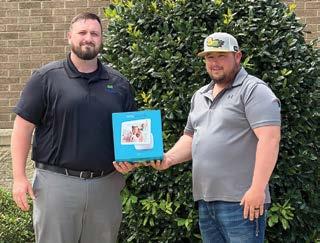
Thank you to everyone who has signed up thus far. We are grateful to provide you with lightning-fast internet. To our Singing River Electric members patiently waiting, we thank you for your continued patience as we build our network.
We look forward to recognizing more subscriber milestones soon!
































“A Time to Kill,” the 1996 film based on Oxford author John Grisham’s first novel, holds the record for the largest studio budget for a movie filmed in Mississippi: $40 million.
The film also boasts the most star power of any movie filmed in the state: Matthew McConaughey, Sandra Bullock, Samuel L. Jackson, Kevin Spacey, Ashley Judd, Donald Sutherland, and Kiefer Sutherland.
The film, set in Canton, Mississippi, was mostly filmed there with a few other scenes filmed in Jackson and Hinds County.
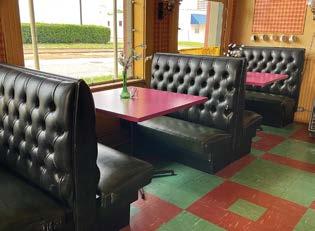
None of that would have been possible without The Mississippi Film O ce.

The o ce, which opened Jan. 17, 1973, is celebrating 50 years of operation and is a testament to the many feature films and television productions filmed in the state before and after “A Time to Kill.”
The film o ce is a bureau of Visit Mississippi, within the Mississippi Development Authority. The o ce’s mission is “to foster the growth of the film industry in Mississippi, connect filmmakers with necessary resources, and to cultivate and promote filmmaking by, for, and about Mississippians.”
One of the incentives Mississippi o ers filmmakers is a 25% to 35% cash rebate on eligible production expenditures and all payroll. The Mississippi Motion Picture Incentive Program began in 2004. The per project minimum investment is $50,000.


But that’s not always the main draw for filmmakers.


“What also makes Mississippi attractive to filmmakers is its wide variety of locations. We’ve got the hill country of north Mississippi, the wide open vistas of the Delta, the river views and historic buildings of Natchez and Vicksburg, the cityscape of Jackson, the beaches and casinos of the Gulf Coast, our plentiful forests, numerous timeless small towns, and the list goes on,” said Nina Parikh, director of the Mississippi Film O ce.
The other feedback filmmakers give the o ce on filming in the Magnolia State is that people are the state’s most valuable resource.


“We often hear how pleased they are with how friendly, helpful, and easy to work with everyone is from local vendors to city o cials to the talented Mississippi crew that they hire. We take pride in how our industry shows people why we’re called The Hospitality State,” Parikh said.

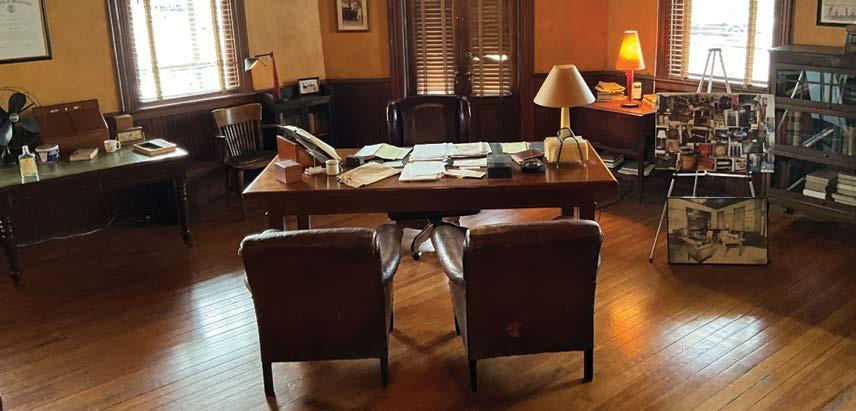





The small city of Canton, in northern Madison County, has two movie museums — one dedicated to the filming of “A Time to Kill,” and another set around the 2000 film, “My Dog Skip,” which was based on the book by Mississippi literary legend Willie Morris.
For “A Time to Kill,” a former restaurant on the courthouse square was transformed into the diner/co ee shop where Bullock’s law student character, Ellen Roark, tries to convince McConaughey’s character, lawyer Jake Brigance, to let her assist in the murder defense of Carl Lee, played by Jackson.
If you walk into the building today, nothing has changed from the 1995 set. It’s all frozen in time. Just upstairs, visitors can find Brigance’s receptionist’s o ce and his own o ce. Everything, including the Jake Brigance Ole Miss law degree in a frame on the wall to his penny loafers, shirts, pants, and blazer McConaughey wore in the film, is still in that o ce.
The o ce still has magazines and Clarion-Ledger newspapers dated 1995 in piles on side tables.
The Willie Morris movie museum — right next door — is a shrine to the author, who donated many of his personal belongings including books, photos, and copies of Harper’s, the magazine he edited from 1967 to 1971.
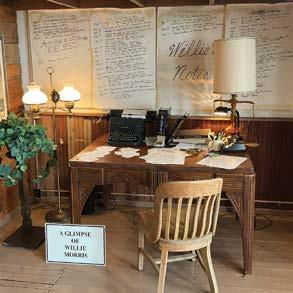
The museum also includes sets and props from the film, “My Dog Skip.” The house where the movie takes place is two blocks from the courthouse square.

The very first movie to be filmed in Mississippi after the creation of the film o ce — director Robert Altman’s quirky bank robbery yarn, “Thieves Like Us” — came out in 1974 and starred Keith Carradine and Shelly Duvall. The movie was filmed in Canton.
“O’ Brother, Where Art Thou,” the George Clooney and John Goodman musical comedy from Oscar winners Joel and Ethan Coen, was shot almost entirely in Mississippi including in Natchez, Leland, Vicksburg, Greenwood, and Canton.
“Home Town” is the popular HGTV show that has been filmed in Laurel since 2016 and features married couple Erin and Ben





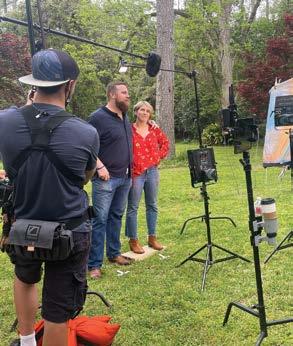





One of the most important jobs Parikh has is scouting locations.
“I’ve scouted for locations with Joel and Ethan Coen for ‘O’ Brother, Where Art Thou,’ about 10 counties in mostly central Mississippi; with John Krasinski for ‘The Hollars’ in Jackson; and with Paul Schrader for ‘The Card Counter’ on the Gulf Coast as well as dozens and dozens of others,” Parikh said.
Parikh said the location of a film will depend on the budget.
“If it’s a small, independent movie, we can’t just put them in the middle of nowhere. We will have to have them close to a bigger city or town,” she said.

Parikh’s personal background “locations” eventually led her to the Mississippi Film O ce where she has now worked for 25 years.


“My mother is from the Philippines, and my father is from India. I was born in Paducah, Kentucky, lived in Rosiclaire, Illinois, then Brooklyn, New York, Indianapolis, Indiana, and finally Brandon, Mississippi by the age of 11,” Parikh said.
Parikh calls herself “a self-identified Mississippian and a proud resident of Jackson.”
“I studied film at The University of Southern Mississippi and New York University. I don’t have a romantic story about how I landed in the filmmaking world. It was a logical conclusion more than anything. Growing up, I loved photography and storytelling. My best friend suggested I should marry those interests together and consider filmmaking. I’ve been working in this industry for more than 30 years at this point. Sometimes your friends know you better than you know yourself,” she said.
Here are 7 of the biggest Hollywood productions filmed in Mississippi:
“MISSISSIPPI BURNING” (1988)
Directed by Alan Parker
Starring Gene Hackman and Willem Dafoe Jackson, Vaiden, and Vicksburg
“A TIME TO KILL” (1996)
Directed by Joel Schumacher

Starring Matthew McConaughey and Sandra Bullock
Canton and Jackson
“GHOSTS OF MISSISSIPPI” (1996)

Directed by Rob Reiner
Starring Alec Baldwin and Whoopi Goldberg

Jackson, Greenwood, Natchez, and Yazoo City
“MY DOG SKIP” (2000)
Directed by Jay Russell
Starring Kevin Bacon and Diane Lane
Canton
“O’ BROTHER, WHERE ART THOU?” (2000)
Directed by Joel Coen
Starring George Clooney and John Goodman
Canton, Natchez, Vicksburg, and Greenwood
“THE HELP” (2011)
Directed by Tate Taylor
Starring Emma Stone and Viola Davis
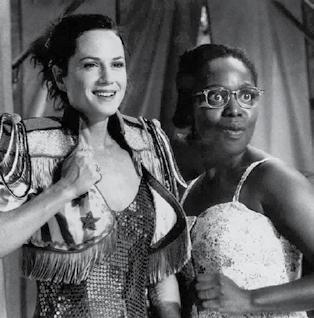
Jackson
“THE CARD COUNTER” (2021)
Directed by Paul Schrader
Starring Oscar Isaac and Ti any Haddish
Biloxi and Gulfport
For more information about the Mississippi Film O ce and a complete list of all the movies and tv shows filmed here, visit www.filmmississippi.org


1-844-AGENT4U



FIXED INDEXED ANNUITIES


MORE GAINS • NO LOSSES • SAFETY





Up to 11% IMMEDIATE INTEREST BONUS on DEPOSITS


ROLLOVER CD OR 401K TODAY!



Not so long ago, goats were niche livestock animals in Mississippi. But these small ruminants have grown in popularity in recent years, especially dairy goats.

“Although there has been a drop in the o cial population numbers, we know interest is growing in Mississippi among all types of goats,” said Leyla Rios, Extension small ruminant specialist with the Mississippi State University Extension Service.

According to o cial statistics from the U.S. Department of Agriculture, meat and other types of goats were estimated at 19,000 head in 2022, down from 21,000 the previous year. Data for dairy goats in Mississippi are not available, but total numbers for the U.S. were down slightly.
Goats make ideal 4-H livestock project animals for young children because of their small size and docile nature. Dairy goats have become the most prevalent among Mississippi 4-H showmanship participants.
Farmers who have limited acreage or want to diversify their livestock operations often choose goats. Others want goats for their meat or milk.
Regardless of the purpose, people who want to join the ranks of goat owners should understand some important aspects of goat ownership before bringing one home.
Rios said people should first identify their production goals.

“What do you want: meat, fiber, milk, or other value-added products? Or do you want to raise purebred, registered animals to sell to other farmers or people who show goats?” she said. “You need to choose the best breed that can meet your long-term production objectives.”
Dairy goat breeds include Alpine, Saanen, Nigerian Dwarf, Nubian, La Mancha, Toggenburg or any cross of these breeds. Meat goat breeds include Boer, Kiko or Spanish.
Breeds with short hair and tropical breeds, such as Nubian, do better in Mississippi’s hot, humid weather.


Goats need about 9 square feet of open area per animal in a barn and 22 feet per animal in a pasture. A shelter is a necessity and depends on an owner’s budget and goals.
“The most important aspect is that it provides protection from the sun and from drafts during cold weather,” said Rios, who is also a researcher with the Mississippi Agricultural and Forestry Experiment Station. “A simple three-sided structure with a roof is su cient for a start, but once the herd grows, you need a more sophisticated barn-type building with internal subdivisions for di erent groups of animals.”
Beginners should start with a few animals and adjust the number per acre over time. Under optimal conditions, an acre can support up to six goats, but owners should have a good grasp of management practices and nutritional requirements before adding more animals, Rios said.
Goats are vulnerable to predators and need a secure, fenced area. Owners may want to consider using guardian dogs as added protection.
“In the South, coyotes are the most common predators of goats. They can attack and kill adults and kids,” Rios said. “The most popular protection used is guardian dogs.”

A goat gets 70% to 80% of its main diet from grasses, forages, and diverse vegetation. The remaining 20% to 30% can be any supplement such as corn, grain, or mixes of cereals, which provide a source of additional energy and protein to balance their diets. They can be commercial mixes or diets mixed on the farm.

Goats should always have a mineral supplement source, which is required for correct metabolic functions and for increased immunity.


The amount of water they need depends on how much water they are getting from fresh grass. In general, goats need 0.3 to 0.5 gallons of clean water per day and up to 3 gallons per day when lactating. Dairy goats especially need enough clean water, which helps increase milk production.






That’s the underlying idea behind a new website and initiative the state’s electric cooperatives have launched to get our members more involved in the decisions that a ect your communities.


Co-ops Vote MS is the initiative, and this is the message: You have the POWER to Register. Be informed. Vote.
Elections are important for determining the future course of Mississippi.
“Not only do we do we want to encourage our cooperative members to vote, but we also want to help you become a betterinformed voter,” said Michael Callahan, executive vice president and CEO of the Electric Cooperatives of Mississippi.
The Co-ops Vote MS website is going to make it easier for members to get informed and to participate in the democratic process.
The website features quick links to important voting information including where to register to vote, our current elected o cials, what elections are occurring this year, and videos of statewide elected o cials talking about the importance of voting, and what they do on a day-to-day basis.






Michael Watson is the Mississippi Secretary of State. That o ce has a section called the Elections Division. The division trains local election o cials, runs elections in Mississippi, and collects campaign finance and lobbying reports.
Watson said registering to vote is easy.
“In the last four years we’ve registered over 200,000 Mississippians in our o ce, and we are really proud of that,” Watson said.
Not only do we do we want to encourage our cooperative members to vote, but we also want to help you become a better-informed voter.
Watson said those that need to register to vote can go to the Secretary of State’s website, download the registration form, fill it out, and deliver it to the voter’s circuit clerk o ce.
Watson said that, to participate in elections in Mississippi, you have to be registered at least 30 days prior to the election.

Watson said voter turnout for local and statewide elections is usually not great.
“During a presidential election, you might see 800,000 to a million voters turn out in Mississippi,” Watson said.


Watson said too many Mississippians and too many Americans gave the ultimate sacrifice for citizens to vote, and we shouldn’t take that for granted.
“Your voice matters. So, to get out, to play an important role in the process of letting your vote count and be heard is important to all of us,” Watson said.
Callahan echoed Watson’s sentiment.
“Voting is a form of participation, and every qualified man and woman in Mississippi should not only cast their vote, but care enough to understand who they are voting for and why,” Callahan said.

And that’s why your electric cooperative has launched Co-ops Vote MS.
July 3 to 10, 2023 – Circuit Clerks o ces will be open longer hours for Mississippians to register. (O ces closed on July 4, 2023)
July 10, 2023 – Registration deadline to vote in the August primary.
Aug. 8, 2023 - Primary Election Day for Statewide, State District, Legislative, County and County District O ces. Polls open from 7 a.m. to 7 p.m.

Oct. 2 to 9, 2023 - Circuit Clerks o ces will be open longer hours for Mississippians to register.

Oct. 9, 2023 – Deadline: Applicants who register in-person in the Circuit or Municipal Clerk’s O ces today are eligible to vote in the Nov. 7, 2023, General Election.
Oct. 10, 2023 - All mailed voter registration applications must be postmarked by this date.
Nov. 7, 2023 - General Election Day and Regular Special Election Day. Polls open from 7 a.m. to 7 p.m.
 with Rebecca Turner
with Rebecca Turner
With the arrival of summer, the grilling season is in full swing. People celebrate summer nights by lighting the grill for flames, food, and fun. But the grill isn’t just for steaks and burgers. It’s perfect for seafood, too! Grilling seafood is easier than you think.
Firm-fleshed fish are perfect for the grill: striped bass, halibut, snapper, or grouper. Other fishes to grill include tuna, mahi, wahoo, tilefish, swordfish, and salmon. Note: Grilling fish with the skin on can make the process easier, reducing the likelihood of sticking to the grates.
Preheat the grill for at least 15 minutes and clean the cooking grates. Fish, unlike other proteins, has a high-water content making it challenging to snag a flavorful sear. Sprinkle filets in salt, then wrap them in paper towels and allow them to rest, drawing out moisture. Lightly brush filets with oil to prevent sticking. Sear the top

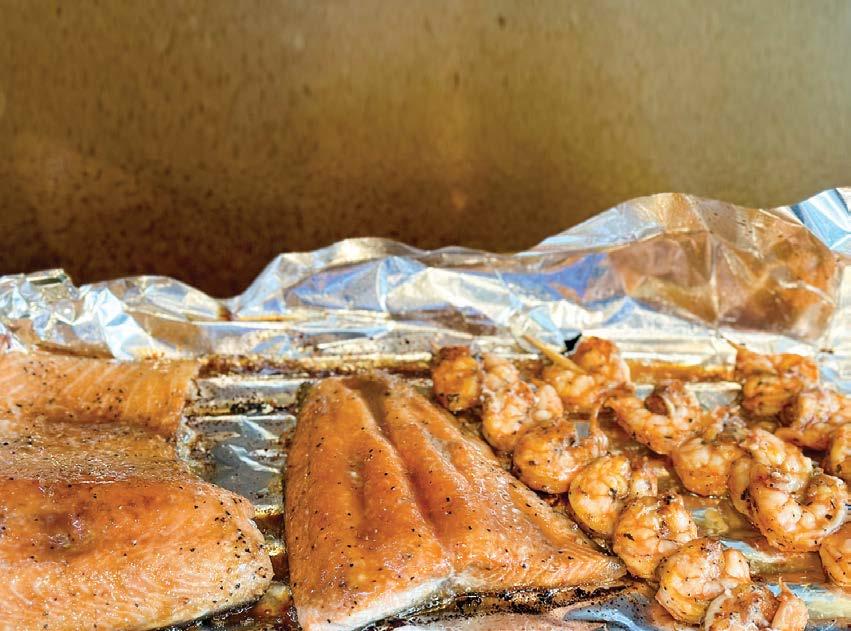
of the filet for two-thirds of the grilling time for desired grill marks and flavor. Note: Charcoal grills are more labor intensive but can get hotter than most gas grills, making them superior for cooking fin fish.
The general rule for grilling fish is 10 minutes for every inch of thickness. Thinner filets are best-grilled cold. Thicker filets should be at room temperature before cooking. Most fish are done when they reach 145 degrees. Aim for 110 degrees for tuna which is medium rare. Allow one good set of grill marks, flip the fish, and lower the heat for the remaining cooking time. Note: Thin, flexible spatulas work best.
Grilled shrimp is the easiest and quickest seafood to cook. To avoid having dry, overcooked shrimp, look for larger varieties, often labeled 16/20. Shell-on shrimp protects the meat and retains more moisture. Rinse shrimp in cold water and pat dry. Place 4 to 6 shrimp per stick, brush with olive oil, and season with salt and pepper. Place the skewers on the hot side of the grill and allow the shrimp to cook for 2 to 3 minutes per side until they are slightly pink with opaque flesh. Drizzle them with olive oil and fresh lemon juice or melted butter. Note: Serve immediately.
Always support your local seafood market or seafood counter, look
1 1/2 pounds salmon filets
Lemon pepper to taste
Garlic powder to taste
Salt to taste
1/3 cup soy sauce
1/3 cup brown sugar
1/3 cup water
1/4 cup vegetable oil
Season salmon filets by sprinkling lemon pepper, garlic powder, and salt to taste (meaning covered, but not coated.) In a small bowl, whisk sugar, water and vegetable oil together until sugar dissolves. Place filets in a large resealable plastic bag; add soy sauce mixture, seal, and turn to coat. Let marinate in the refrigerator for a minimum of 2 hours. Preheat an outdoor grill, and discard marinade. Cook salmon for 10 minutes for every inch of thickness. Cook top down first for 6-7 minutes and flip to finish cooking skin (or bottom) side down. It’s done when fish flakes easily with a fork.
teaspoon garlic powder
tablespoon black pepper
cup Worcestershire sauce
tablespoons Italian-style salad dressing
pound large shrimp, peeled and deveined (tails attached, optional)
cup butter, melted tablespoons Worcestershire sauce (for basting)
In a large bowl, mix garlic powder, black pepper, 1/3 cup Worcestershire and dressing; add shrimp and toss till coated. Refrigerate covered for an hour. Preheat the grill to high heat. Thread shrimp on skewers, piercing once near the tail and once near the head. Discard marinade. In a small bowl, whisk honey, melted butter, and remaining 2 tablespoons Worcestershire sauce. Set aside for basting. Lightly oil the grill grate. Grill shrimp for 2 to 3 minutes per side, or until opaque. Baste occasionally with the honey-butter sauce while grilling. Serve immediately.
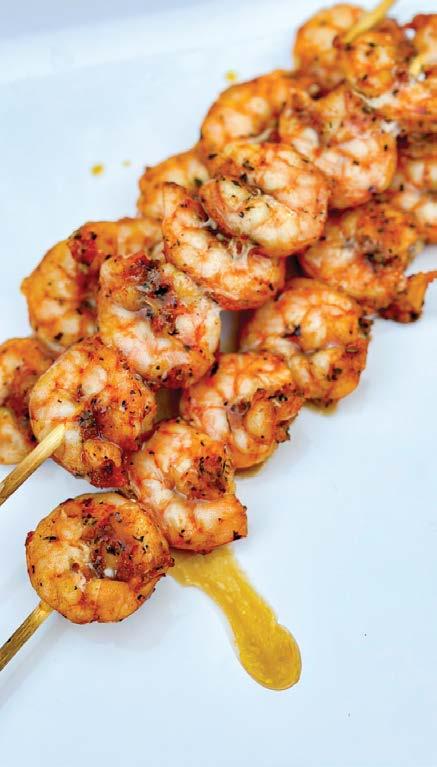 by Rebecca Turner
by Rebecca Turner
Rebecca Turner is an author, registered dietitian, radio host, television presenter and a certified specialist in sports dietetics with the Academy of Nutrition and Dietetics. A lifelong Mississippian, she lives in Brandon and has spent the last decade offering nononsense nutrition guidance that allows you to enjoy good health and good food. Her book, “Mind Over Fork,” challenges the way you think, not the way you eat. Find her on social media @RebeccaTurnerNutrition and online at www.RebeccaTurnerNutrition.com.











Events open to the public will be published free of charge as space allows. Submit details at least two months prior to the event date. Submissions must include a phone number with area code for publication. Email to news@ecm.coop. Events are subject to change.




The 11th Interactive Civil War Relic Show. June 10 and 11. Brandon. The show will include vendors, living history, antiques, reenactors, prints, weapons, Vietnam, Korea, WWI and II as well as Civil War militaria, Native American artifacts, free genealogy research, Mississippi authors, artists, and musicians. Brandon City Hall, 1000 Municipal Dr. Admission proceeds will benefit the Wounded Warriors of Mississippi. Details: 769-234-2966
Blueberry Jubilee. June 10. Poplarville. From 8 a.m. to 4 p.m. Arts and crafts, storytelling, live entertainment, a 5K run, a car show, and blueberries. Held downtown. Details: 601-795-7033.
Clarke County Farmers Market. June 17, July 15, Aug. 19, Sept. 16, Oct. 21. Quitman. Every third Saturday thru October. 8 a.m. to 1 p.m. Lots of fresh produce, food vendors, and arts and craft vendors. Depot parking lot on Railroad Avenue. Sponsored by the Clarke County Chamber of Commerce. Details: 601-776-5701
Ricky Atkinson and Compassion. July 2. Petal. The First Baptist Church of Runnelstown will host the concert at 6 p.m. A love o ering will be received. The church is located at 9211 Highway 42. Details: 601-583-3733 or 601-325-4047.

Je and Sheri Easter and Ricky Atkinson and Compassion. July 3. Waynesboro. The concert will start at 7 p.m. at the South Mississippi Freewill Baptist Campground, 1400 Pine Grove Road. This free indoor concert will be the part of 65th Southern Gospel Sing. Bring lawn chairs. Concessions will be available and a love o ering will be received. Details: 601-735-9083 or 601-270-1543
The 31st Clarke Fest. Sept. 23. Quitman. Archusa Water Park, 540 County Road 110. 9 a.m. to 4 p.m. Car show, entertainment, Miss Clarke County pageant, fishing tournament, arts, crafts, food vendors, and kid’s zone. Sponsored by Clarke County Chamber of Commerce. Details: 601-776-5701


Holy Land Tour Oct. 27 to Nov. 5. Join Ronnie and Beverly Cottingham for their 23rd year to host the trip. Departures from Jackson or New Orleans. Details: 601-770-1447 or email rbcottingham@bellsouth.net

Around the end of May and the first of June every year, our day lily beds are usually at their peak. Only this year, Miz Jo and I are wondering what has happened? We are used to a bunch of di erent colors popping out from the plants we’ve ordered or have been gifted over the years or bought from growers we’ve run across around the state. However, for a few years now, we’ve noticed our beds seem like they don’t fill out like they used to. But we weren’t sure. This year, however, the lilies are o .
Back at the end of April they started blooming. But only red lilies showed up at first. Also, it seemed like there were a lot more of them than I remembered. But since we had dug up some plants and combined them with others over the winter, I figured we’d must have inadvertently bunched up a lot of reds.
So, I expect we’ll make up our minds to either live with the situation and just keep the weeds out as best we can or get the catalogues down, reorder, and replant. Same kind of decisions we’re faced with a lot of time in life. Live with it or do something about it.
But when I started looking back through my files of photographs to try to pick a subject for this month’s article, I was bombarded with the pictures of lilies from years past. Now, I really am wondering why our lily beds have gotten so sparse.


My first suspect is the weather. The weather has been unkind to my gardening activity for a couple of years. For instance, I didn’t get a single tomato o my vines last year. I chalked it up to the heat. I planted late and tomatoes don’t do well above 90 degrees. And as I recall, we had temperatures in the 90s well into October.


But as far as the poor showing of our day lilies this year, we had a weird winter. A warm snap in February popped us into the 80s for a week or so. We were saying, if it got this hot already what would August




be like? And about the time we figured winter must not be coming back, an arctic cold front blew in, and dropped us into the deep freeze. My kitchen thermometer keeps up with the hottest and the coldest outside temperature since the last battery change. Since the recharge, it’s been as hot as 93 degrees and as cold as 13. I don’t think the 93 would hurt the day lilies that much. But I’m not so sure their bulbs would survive many overnights in the teens.
Now, I have to admit the weather may not be the culprit at all. Maybe Jo and I just haven’t had the time to fuss with the flower beds like we used to. There has been a lot of life going on lately. Good and bad. But all of it time consuming.
So, I expect we’ll make up our minds to either live with the situation and just keep the weeds out as best we can or get the catalogues down, reorder, and replant. Same kind of decisions we’re faced with a lot of time in life. Live with it or do something about it.




 by Walt Grayson
by Walt Grayson





